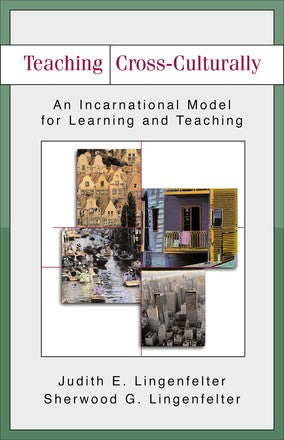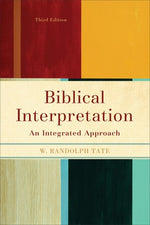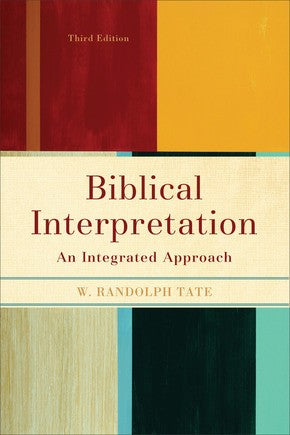Biblical Interpretation: An Integrated Approach
Couldn't load pickup availability
- Binding:
- Paperback
- ISBN:
- 9780801049859
- Publisher:
- Baker Academic
ISBN: 9780801049859
Type: Paperback
"In this significantly expanded edition, Tate brings the advantages of an integrated understanding of biblical hermeneutics to a new generation of interpreters. His typology proves itself a flexible and reliable framework for the study of biblical hermeneutics."--William Yarchin, School of Theology, Azusa Pacific University
The third edition of Biblical Interpretation focuses on the three "worlds" of biblical interpretation--the world behind the text, the world of the text, and the world in front of the text. A fourth section helps readers combine the three worlds into an integrated hermeneutical strategy. Clear explanations of the various interpretive approaches are supported by helpful biblical examples. Key terms and study questions at the end of each chapter make this book ideal for classroom use. Succinct synopses highlight a host of distinct approaches to understanding the Bible. The third edition includes new synopses and an updated bibliography to help readers keep pace with the most recent developments in biblical interpretation.
Contents
Preface to the Third Edition
Preface to the Revised Edition
Preface
Introduction: A Journey into Three Worlds
Author-Centered Approaches to Meaning
Text-Centered Approaches to Meaning
Reader-Centered Approaches to Meaning
An Integrated Approach to Meaning
UNIT I: THE WORLD BEHIND THE TEXT
Chapter 1: Why Study Backgrounds? An Apology for Historical Research
Summary
Review & Study
Chapter 2: The Importance of Language: The Grammatical Background
Phonology
Morphology
Lexicology
Syntax
Summary
Review & Study
Chapter 3: Reading and the World Behind the Text: The Historical and Ideological Backgrounds
Historical and Cultural Background
Some Examples of Historical Background Studies
The Ideological Context
The Ideological World of the Old Testament
Examples of Comparative Study
The Ideological World of the New Testament
Summary
Review & Study
Supplement I: Illustrative Methods That Focus on the World Behind the Text
Source Criticism
Social-Scientific Criticism
Canonical Criticism
UNIT II: THE WORLD WITHIN THE TEXT
Chapter 4: The Bible as Literature and Literary Forms
Common Literary Sub-Genres
Archetypes
Summary
Review & Study
Chapter 5: How the Hebrew Bible Communicates as Literature
Hebrew Narrative
Hebrew Poetry
Hebrew Prophecy
Summary
Review & Study
Chapter 6: How the New Testament Communicates as Literature
The Gospels and Acts
The Gospel of Matthew: A Model
Sub-Genres in the Gospels
Epistolary Literature
Sub-Genres in the New Testament Epistolary Literature
Apocalyptic Literature
Summary
Review & Study
Supplement II: Illustrative Methods That Focus on the World Within the Text
Redaction Criticism
Literary Criticism
Genre Criticism
UNIT III: THE WORLD IN FRONT OF THE TEXT
Chapter 7: What Happens When We Read?
The Dialectics of Discourse
Summary
Review & Study
Chapter 8: What the Reader Brings to the Text: The Role of Reader Presuppositions
The Role of Preunderstanding
Reader Presuppositions
Theological Presuppositions
Summary
Review & Study
Supplement III: Illustrative Methods That Focus on the World in Front of the Text
Reader-Response Criticism
Autobiographical Criticism
Feminist Criticism
UNIT IV: INTEGRATING THE THREE WORLDS
Chapter 9: Mark’s Gospel and the Merging of Three Worlds
Mark’s Use of Literary Allusion
Mark’s Use of Intercalation
Jesus’ Relationship to His Contemporary Worldview according to Mark
Conclusion: The Ending of Mark and the Predicament of the Reader
Review & Study
Conclusion: The Never-Ending Story
APPENDIXES: SYNOPSES OF ADDITIONAL INTERPRETIVE METHODS EMPLOYED BY SCHOLARS
Overview: How Methods Affect Interpretation
Appendix I: Methods That Focus on the World behind the Text
Form Criticism
Genetic Criticism
Tradition Criticism
Appendix II: Methods That Focus on the World within the Text
Formal Criticism
Rhetorical Criticism
Speech Act Theory
Structuralism
Appendix III: Methods That Focus on the World in Front of the Text
African-American Criticism
Cultural Criticism
Deconstruction
New Historicism
Postcolonial Criticism & Liberation Theology
Reception Theory
Womanist Criticism/Theology
Appendix IV: Methods Involving More than One World
Ideological Criticism
Intertextual Criticism
Marxist Criticism
Mimetic Criticism
Narrative Criticism
Socio-Rhetorical Criticism
Indexes
- Weight:
- 1.125 lb




